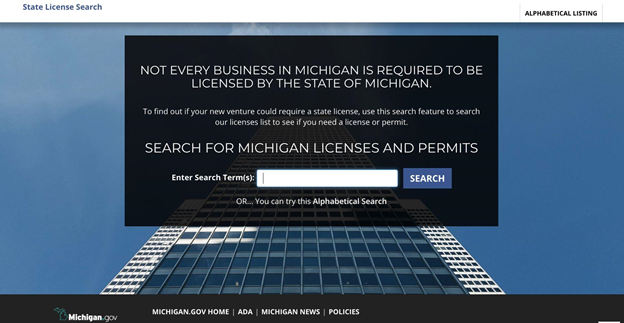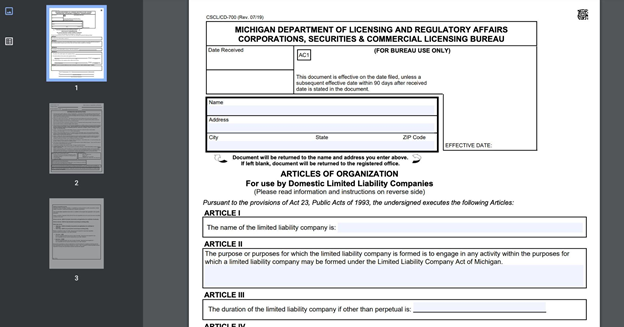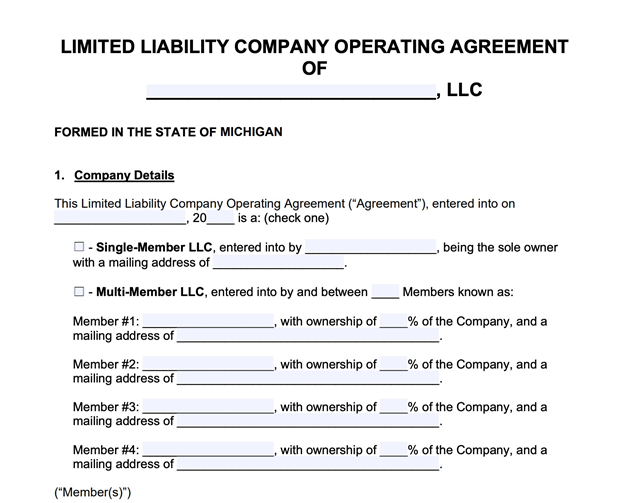So you’re looking to start a business in Michigan, an LLC specifically.
First of all, congratulations. This is an exciting venture.
But before you get too ahead of yourself, you’ll want to make sure you’re following the necessary steps to ensure that your Michigan LLC is created in the right way.
An LLC (limited liability company) is the most popular business entity for starting a small business.
Why?
Because LLCs are a hybrid of corporations and partnerships. They take pieces from each type of business structure and meld them together to create something ideal for someone starting small and likely on their own or with just a few owners or members.
To help you ensure that you start your Michigan LLC correctly, we have created this guide with steps to help you get off your feet and into success.
The Easy Parts of Starting an LLC in Michigan
Many people are intimidated by the idea of starting a business. And they aren’t wrong–it can be overwhelming. There are so many moving parts, and it seems like quite the challenge to ensure you are doing everything correctly and legally.
But the process of starting an LLC doesn’t have to be intimidating. By tackling each step of forming your LLC one by one with the help of this guide, you can get through the process in the best way and set yourself up for success.
So, let’s start with some of the easy stuff.
Choosing the name for your LLC in Michigan is one of the most fun parts of starting your own business. It is where you can get creative and set the tone for your business.
Your name may reflect the type of industry you’re going into. It may be a family name. Or it may be something completely out there (we are looking at you, Google).
Once you’ve settled on a name for your LLC, you need to make sure it is available. Michigan law states that your LLC cannot have the same name as or a very similar name to any other LLC, corporation, or limited partnership in the state.
For example, if you are looking to start a company called The Corner Bakery, LLC, and a company in the state of Michigan already exists called A Corner Bakery, LLC, the names are too similar. You’d have to choose a different name.
How do you know if someone already has a business with the name you’ve chosen?
You check on Michigan’s business entity database. Enter the required information, and you will quickly find out if your business name is available in the state of Michigan.
A tool that you can use to help you come up with a business name is Shopify’s business name generator.

Though Shopify is known primarily as a platform to sell products, there is much more to it than that, including this tool that helps you come with ideas for a business name.
By typing in one word that describes your brand, Shopify will spit out a range of different business names that you can choose from or be inspired by. Take the time to find the one that’s right for your brand by picking something memorable, clear, and unique. You want customers or clients to remember your business name and understand what your business is selling. And you want your business name to be unique, so you stand out from the crowd.
In addition to helping you generate a business name, Shopify may be your go-to tool for other parts of your Michigan LLC, which we will cover in more detail below.
The Difficult Parts of Starting an LLC in Michigan
If only starting an LLC in Michigan was all fun and games.
But the reality is that there are tricky parts you must navigate to get your business where you want and where you need it to go.
Here are some of those tough things to watch out for.
Nobody likes paying taxes, and it becomes even less fun when you’re running your own business.
LLC taxes are different from personal taxes (unless you are a sole-member LLC), so be ready to face some challenges in this. They are also different from other business entity taxes, so make sure you pay attention specifically to the laws for LLCs.
LLCs are pass-through entities, which we will get into more in step 6.
If it feels overly complicated to you (if it does, you are not alone), then you’ll want to consider hiring an accountant to take care of your LLC taxes for you. This ensures everything is done right, and you may find it is worth the additional business expense to get your taxes done correctly the first time.
Step 1: Pick a Business Name
As mentioned above, the business name you choose for your LLC is an integral part of the process and can be a fun one.
It is where you want to start in building your business.
The name should be something that people will remember, making you stand out from potential competitors.
Shopify’s business name generator is a great tool that is just a part of what you get if you sign up to sell your brand’s products through this platform.

Shopify provides LLCs with the tools they need to build an ecommerce website that helps with everything from finding new customers to dealing with the day-to-day operations of your company.
Some of the features you’ll enjoy with Shopify include:
- 70+ professional themes to choose from
- Customizable sites
- Custom domain name
- Full blogging platform
- Hosting
- Content management system
- Free SSL certificate
- Low credit card rate
- Flexible shipping rates
If you’re considering Shopify to help you provide an easy platform to sell your LLC’s products, then you’ll want to take a look at the different Shopify package options.
- Basic Shopify. $29 per month. Best for new businesses with little to no in-person sales.
- Shopify. $79 per month. Best for growing businesses that sell both online and in-person.
- Advanced Shopify. $299 per month. Best for scaling businesses that need advanced reporting.
Step 2: Pick a Resident Agent
This sounds much more official than it is, so let’s break it down for you.
A “resident agent” is simply the person that you appoint to receive official mail on behalf of your LLC.
There are a few rules for your resident agent:
- It can be an individual or a commercial entity
- They must have a physical address in Michigan (a P.O. box won’t cut it)
- They must be 18 years old
- They must be able to accept mail during business hours
Some people opt to appoint themselves as the resident agent for their LLC, while others choose a commercial provider that offers more privacy. Many different online legal services are licensed to act as registered agents in Michigan, so you may want to consider this option for your LLC.
We do not recommend being your own resident agent because you must be available during all regular business hours. If you miss an important delivery, such as lawsuit service, you will be in trouble.
Step 3: Get Business Licenses
Whether or not you need a business license to operate your LLC in Michigan depends on the type of business you’re running. To determine whether your LLC needs a specific license, you can use Michigan’s State License Search.

With one quick search, you’ll find out what licenses (if any) that you need to operate your LLC in the state of Michigan legally.
You’ll also want to check with the city and county laws where you’ll be running your business to see if they require any business licensing different from the state’s requirements, which does happen.
Once you have registered your LLC, you’ll need an Employer Identification Number (EIN). If you are a sole proprietor, you may not need one, but all other LLCs do, both to pay taxes and for things like opening a business bank account and hiring employees.
Step 4: File the Articles of Organization
The articles of organization for your Michigan LLC outline the statements required to form an LLC in the state. They are also referred to as the certificate of formation and serve as a legal document that shows your LLC is established at the state level.
You file your articles of organization with LARA, and you can opt to either fill out the paperwork by hand and mail it in or do everything electronically. You are required to pay a filing fee as well, which currently stands at $50.

The information you need to complete this paperwork is fairly straightforward:
- Business name
- Purpose of the LLC
- Duration of the LLC
- Resident agent name
- Street address of the registered office
- Mailing address of the registered office (if different from above)
- Additional provisions
- Name, signature, and date of the organizer filling out the form
Once LARA has reviewed your articles of organization, your LLC will be filed in the state records.
Step 5: Create an Operating Agreement
Though an operating agreement is not required by the state of Michigan, it is highly recommended to keep your business organized.
An operating agreement is something put in place that outlines the daily operations of an LLC. This is of great import when you have an LLC with multiple members, as this agreement is where the responsibilities of each member will be described, as well as the rights of each member.

Some of the key things included in the operating agreement are:
- Each member’s capital contribution
- Each member’s profit share
- Each member’s voting rights
- How the LLC meets
- How the LLC votes
- How new members to the LLC are admitted
- What dissolving the LLC looks like in terms of procedure and conditions
All members of the LLC must review and sign the operating agreement before it goes into effect.
Step 6: Pay Taxes
As we mentioned above, taxes are a major part of an LLC. The way that taxes are done for this type of business entity is different than any other. With an LLC, the owners or members of the LLC pay income taxes on their portion of the LLC’s income.
For starters, LLCs are pass-through entities.
What does that mean?
It means that taxes aren’t paid by the LLC itself but rather by the owners of the LLC. Whoever the owners or members of the LLC are must pay Michigan state incomes taxes on their portion of the LLC’s income. Thus, if you are the only owner or member of the LLC, you pay 100% of your LLC’s income taxes. If you are a co-owner of the LLC, you split the taxes on your LLC’s income.
All LLCs doing business in Michigan must file an annual statement with LARA, the Michigan Department of Licensing and Regulatory Affairs. This must be submitted by February 15th of the year following the LLC’s formation and contains information about your business and your business’ resident agent (the person who received official mail on behalf of your LLC).
In addition to the income tax you must pay for your LLC, you are also required to pay unemployment insurance taxes and collect sales tax on any services provided or products sold. In addition to that, you need to withhold employee income taxes and pay these to the IRS.
Again, you may want to consider hiring an accountant to ensure you’re on the right track.
Step 7: Fulfill State Employer Obligations
The state of Michigan requires that LLCs who have employees need to do the following:
- Report employees. You must report new employees within 20 days of the hire date.
- Withhold taxes. You are required to withhold federal, state, and local income taxes from employee’s wages and pay them to the IRS.
- Pay unemployment taxes. You must pay unemployment taxes. The amount you’re required to pay depends on how long your LLC has been in operation and how many unemployment claims have been made.
- Buy workers’ compensation insurance. This is required to purchase for most employers in the state of Michigan.
Step 8: Remain in Good Standing
Once you’ve established your LLC in Michigan, you need to ensure that it stays in good standing with the state.
You can do this by making sure that business finances are kept separate from personal ones. In addition to that, you may want to open a business bank and a business credit card for business transactions and business expenses.
from Quick Sprout https://ift.tt/3orWnph
via IFTTT
No comments:
Post a Comment